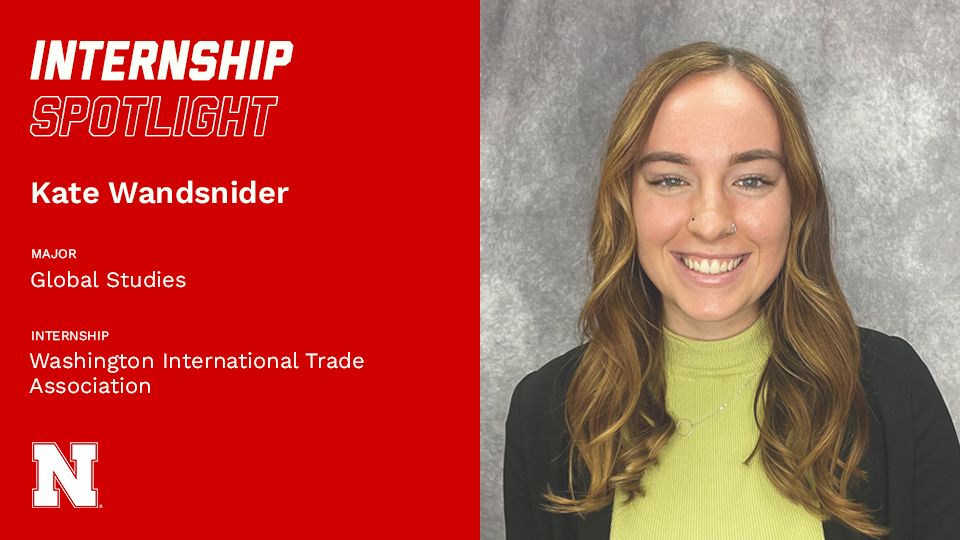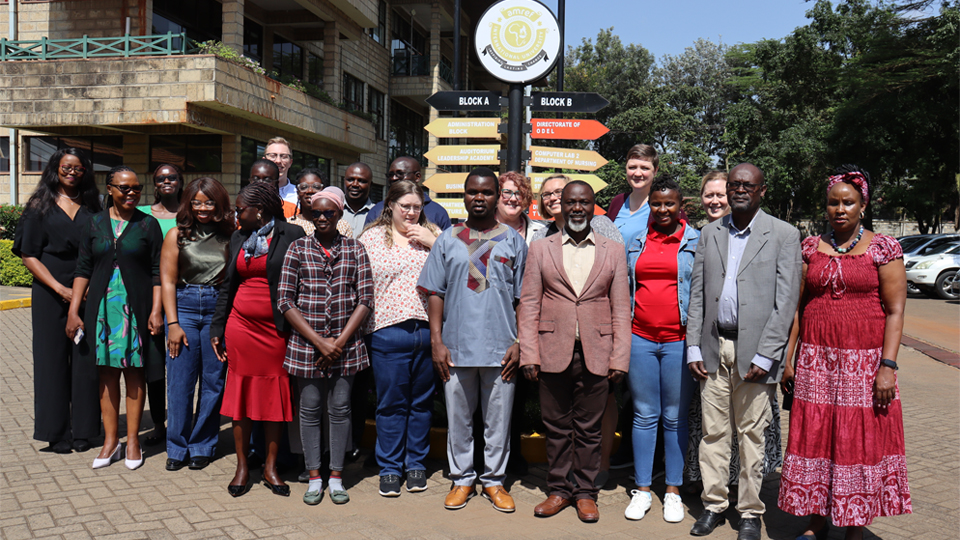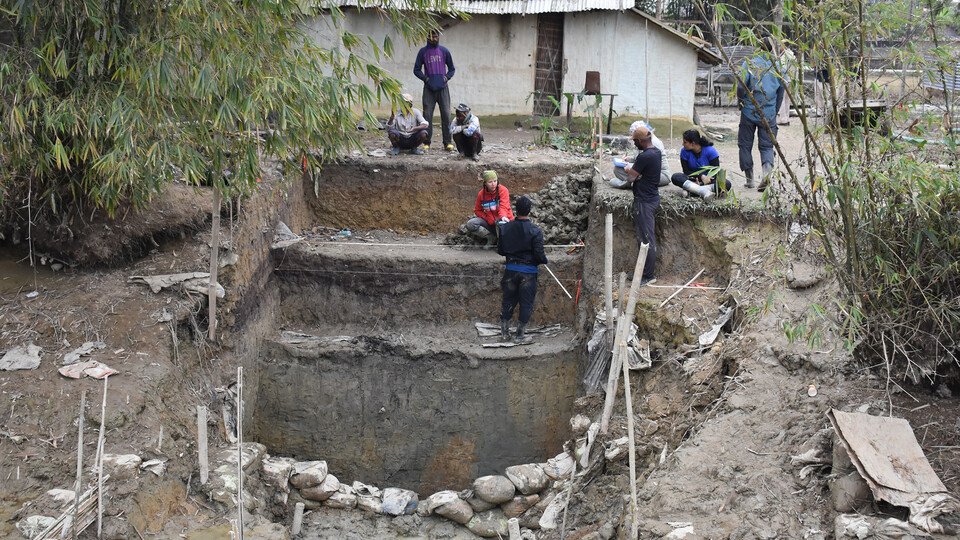
What better way to learn about conflict resolution than first-hand from one of the architects of Ireland's Good Friday Agreement, former prime minister Bertie Ahern? Or to connect with Yazidi culture by growing a garden with the local community?
In the new summer course "Negotiating Peace: From Conflict to Coexistence" from the Global Studies program, 14 University of Nebraska-Lincoln students are exploring conflict resolution case studies from two countries in different stages of the process: Ireland and Syria.
After participating in a mock mediation of the process that led to the agreement—and gaining negotiation experience—students connected with Ahern via Zoom.
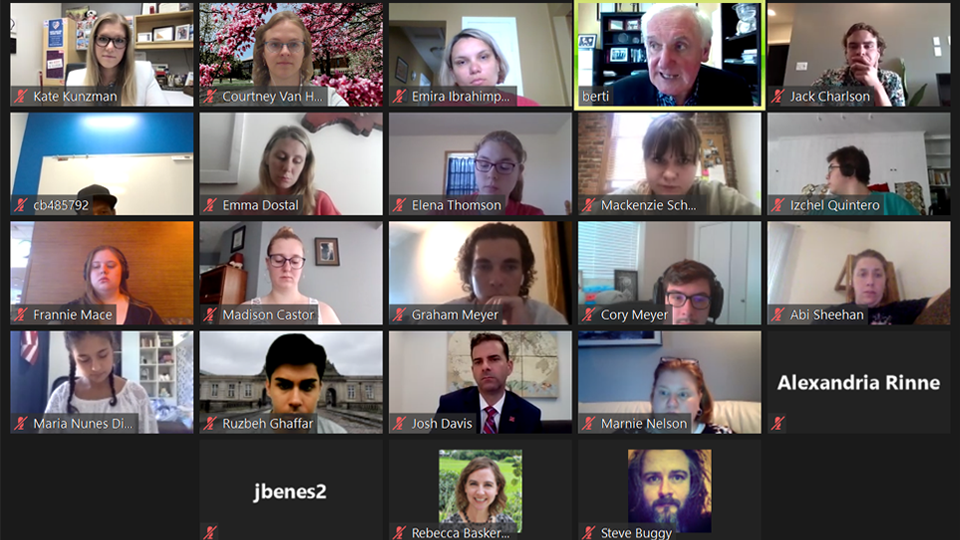
Students meet with Bertie Ahern via Zoom
"[It was] an incredible opportunity for students," Katelyn Kunzman, coordinator with the Office of Education Abroad, wrote in a tweet. She co-developed the course with Emira Ibrahimpasic, assistant professor of practice in the Global Studies program, and they both serve as instructors.
For eight weeks, students are learning theories of conflict management and peace processes; developing analytical, mediation, and negotiation skills; and considering their role in the process.
"This course aims to give students a chance to engage with the reality of the behind-the-scenes process that goes into peace negotiations," Ibrahimpasic said. "They put theory to practice through case studies, mock mediations, and interactions with people who have been integral parts of past peace negotiations."
In addition to Ahern, experts and those affected by conflict provide an array of perspectives from around the world as guest speakers, including: a professor from Trinity College Dublin at Belfast, a public affairs expert who worked at the senior level in government, a politician and journalist who also helped with the Good Friday Agreement, a former United Nations diplomat, an expert who was at the Syria negotiations, and a local Syrian refugee.
To include the perspective of American negotiators working on the Israel and Middle East peace processes in the 1990s, students can view the film "The Human Factor" at the Mary Riepma Ross Media Arts Center.
List of guest speakers
- Bertie Ahern, Former Taoiseach of Ireland and the architect of the Good Friday Agreement
- Judy Alkriez, a local Syrian refugee talk about her experience during and after the Syrian war.
- Wa’el Alzayat, Senior Fellow, Middle East Institute and CEO of Emgage Foundation, a national Muslim American civic engagement and political mobilization organization. He was at the Syria negotiations led by the United Nations. Alzayat previously served with distinction as a U.S. Middle East policy expert at the U.S. Department of State for ten years, including as senior policy advisor to U.S. Ambassador to the U.N. Samantha Power, Syria outreach coordinator with Ambassador Robert Ford, and special assistant to U.S. Ambassador to the Iraq James Jeffrey. He was recently named Top 10 Inspiring Arab Americans Leaders by the Huffington Post.
- Bassam Aramin and Rami Elhanan from the Parents Circle – Families Forum (PCFF), a joint Israeli-Palestinian organization of over 600 families, all of whom have lost an immediate family member to the ongoing conflict. The PCFF utilizes education, public meetings, and the media to spread the idea that sustainable peace requires reconciliation between nations.
- John Bell the former Middle East Director in Jerusalem for Search for Common Ground, a global conflict resolution organization. He is also a former United Nations and Canadian diplomat who served at Canada’s embassy in Cairo, a member of Canada’s delegation to the Refugee Working Group in the peace process in the 1990s, political advisor to the Personal Representative of the Secretary-General of the United Nations for southern Lebanon, advisor to the Canadian Government during the Iraq crisis in 2002-03, and consultant to the International Crisis Group on developments in Jerusalem. He is a founding member of the “Jerusalem Old City Initiative” of University of Toronto and University of Windsor. Bell was also spokesperson for the Canadian Department of Foreign Affairs and communications coordinator for the Signing Conference for the International Treaty to Ban Landmines in Ottawa, 1997.
- Steve Buggy, a political consultant on electoral systems and strategy, conflict resolution and prevention, peace-building, and civil society.
- Ex-political prisoners with Coiste, an organization of republican and loyalist ex-prisoners and former members of the British Armed Forces who give talks together to share different perspectives of those who actually took part in conflict and violence.
- David Mitchell, an Assistant Professor in Conflict Resolution and Reconciliation at the Irish School of Ecumenics, Trinity College Dublin at Belfast, where he teaches on the Master’s in Conflict Resolution and Reconciliation. He is author of Politics and Peace in Northern Ireland: Political Parties and the Implementation of the 1998 Agreement and co-author of Ex-combatants, Religion and Peace in Northern Ireland.
- Derek Mooney has worked in public affairs and communications in Ireland (North and South) for over two decades, including six years at the senior level of government as the Programme Manager and Political Adviser to an Irish Cabinet Minister in the Fianna Fáil and Progressive Democrat government (2004 – 2007) and the Fianna Fáil and Green Party government (2007 – 2011).
- Jane Morrice is a Northern Irish politician and journalist who helped architect the Good Friday Agreement. She is the former Deputy Speaker of the Northern Ireland Assembly, former Head of the European Commission Office in Northern Ireland, and former reporter for BBC Belfast. Morrice was Vice President of the European Economic and Social Committee (EESC), served two terms as Deputy Chief Commissioner of the Northern Ireland Equality Commission, and was a prominent member of the Northern Ireland Women's Coalition.
Another new summer course, the Geography program's "Ethnographic Field School: Garden, Food, and Community Outreach with Yazidi Farmers", is connecting six students with local Yazidi culture.
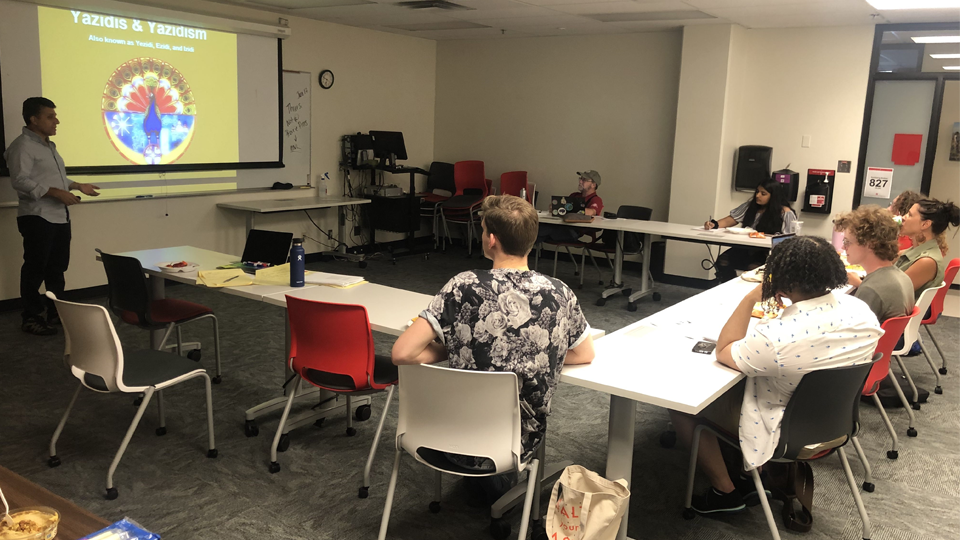
Students in the GEOG 491 classroom.
The course was developed by faculty members Gwyneth Talley and Michael Shambaugh-Miller, who partnered with Community Crops and Yazda's Yazidi Cultural Center. Students learn ethnographic field methods, build cross-cultural communication and collaboration skills, and gain an understanding of the Yazidi community in Nebraska and Iraq. They additionally raise awareness of the Yazidi community and help them improve English-speaking skills.
"When the call for proposals came out, I was approached by Dr. Talley with an idea focused on how gardening, food, and agriculture were a unique form of cultural expression and a way of hanging on to one's 'roots', pun intended," Shambaugh-Miller said. "The question was, could we tie that to a question or situation—and the local immigrant community in Lincoln provided the obvious answer of yes."
Hadi Pir and Shahab Bashar with Yazda and Meg McGuffy and Amy Gerdes with Community Crops are providing outside expertise. Pir is also a graduate student at Nebraska.
"So many of the peoples forced from their homelands have a deeper connection to food," Shambaugh-Miller said. "By teaming up with the local Yazidi population, we expose our students to not only the chaos and heroism of the individuals and families who experienced this atrocity, but also show them that food is something that can help bind together and heal a community as well as act as a bridge to others."
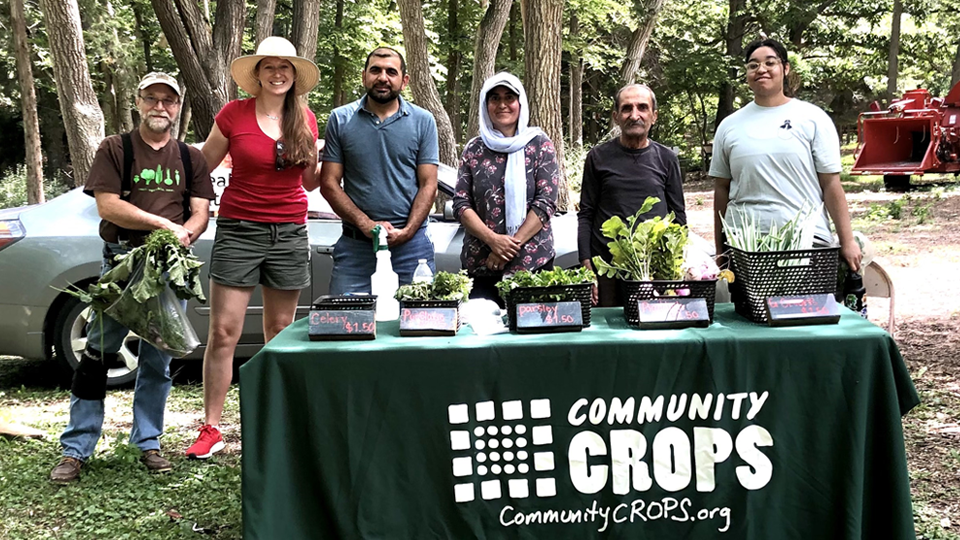
Instructor Gwyneth Talley and Geography 491 participants at a Community Crops table.
The course has been a hit with students.
"It is the perfect culmination of my interests, anthropology, and applying it to food and food functions culturally with a community," anthropology major Asa DeWitt said. "I like how the function of a food system as it is being recreated in a population that has been displaced."
Hyacinth Purcell, an undergraduate with majors in violin performance and anthropology, is excited about the hands-on field research, and global studies undergraduate Ashna Anikumar Gehlot and anthropology graduate student Kat Krutak like the connection to the Yazidi community.
"I think learning about this community and what their plight has been over the past 10 years and even further back and their historic persecution and how they are resilient has been incredible," Krutak said.
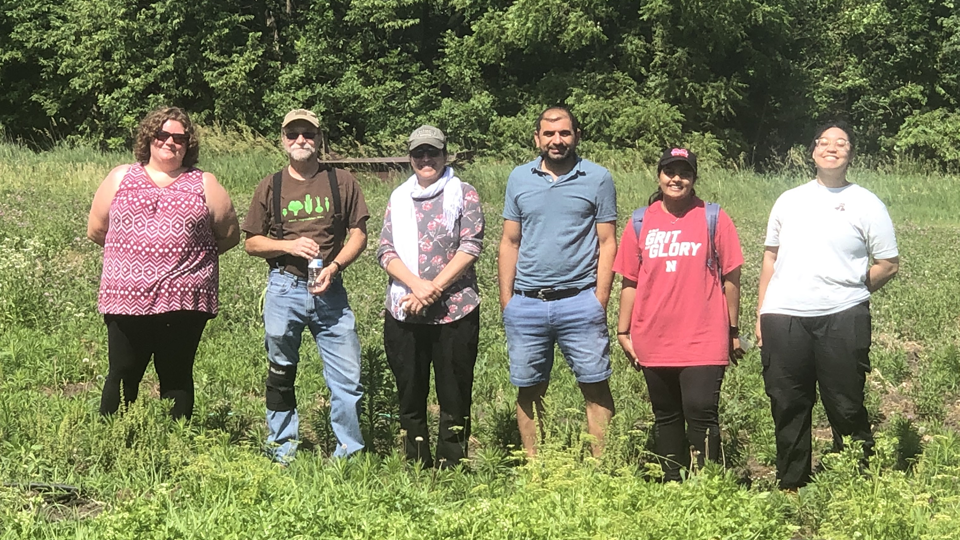
Participants of Geography 491 outside.
The global studies and geography courses are two of 25 Global Experiences programs, new virtual and global-local experiential learning courses offered as alternatives to traditional study abroad programs. Connected to the learning outcomes of faculty-led education abroad, they support the strategic plans of the college, the university, and the Office of Global Strategies.
Financial support comes from the Global Experiences Innovation Fund, which aims to provide engaging global experiences through hands-on coursework that enables cultural interaction without travel.
The Global Studies course would have been impossible without the support of the fund, Ibrahimpasic said.
"Many of the speakers hail from across the globe, and having a chance to interact with them one-on-one via Zoom has been essential in making this course a success."
The Global Studies and Geography programs are part of the School of Global Integrative Studies within the College of Arts and Sciences.
Global Experiences opportunities will continue into the fall semester. Students can learn more about them and register in MyRED.

